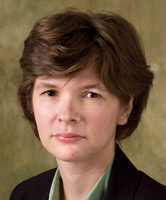Aug 14 2014
Assistant Professor Maria Gracheva, Clarkson University Department of Physics, has received a CAREER award from the National Science Foundation (NSF) to perform research on computational models of solid-state devices for biomolecular sensing and detection.
 Maria Gracheva
Maria Gracheva
Through her grant, "CAREER: Coupling nanoscale device modeling with course-grained biomolecular simulations," Gracheva will receive $400,000 over five years from the NSF for her research.
"This award is a huge mark of approval from the scientific community," she said. "I am honored and excited to receive it."
The Faculty Early Career Development (CAREER) Program is an NSF-wide activity that offers the Foundation's most prestigious awards in support of junior faculty who exemplify the role of teacher-scholars through outstanding research, excellent education and the integration of education and research within the context of the mission of their organizations, building a firm foundation for a lifetime of leadership in integrating education and research.
The Division of Materials Research and the Division of Chemical, Bioengineering, Environmental and Transport Systems at NSF both contribute funds to this CAREER award, reflecting Clarkson’s vision of excellence for research, which links the strengths in engineering with sciences and biomaterials.
Gracheva's research focuses on the computer simulation of nanoscale electrically tunable solid state devices for biomolecular sensing, detection and manipulation. In recent years, the ability of the gate-operated nanopore in a solid-state membrane to exert influence on a biological molecule traversing the nanopore has become increasingly appreciated in the view of a truly breakthrough potential in cheap and ultra-fast DNA sequencing with applications in research, national security and personal medicine.
Gracheva will use her award to investigate novel membrane device compositions which enable unique control over a single biomolecule in the vicinity of the device, all done through the use of computers. Theoretical understanding of the electric phenomena in nanoconfinements of semiconductor membrane devices, such as the influence on ionic transport and biomolecule dynamics could impact broad applications in bio-nanotechnology and bioengineering, and will contribute to understanding analogous processes in biomimetic systems. Ultimately, this program serves as a foundation for educational and research projects related to bio-nanotechnology, bio-molecule sensing, manipulation and characterization, including DNA sequencing.
"At times things behave differently in confined spaces," she said. "We build computer models of physical phenomena at the nanoscale to see how we can use these new and unusual interactions and properties to analyze biomolecules such as DNA and proteins."
Gracheva has taught solid state physics, biophysics, computer modeling in physics and physics for life sciences among other courses at Clarkson, incorporating whenever possible the modern problems and questions into the educational curriculum. Many undergraduate students have been involved in her research group since 2008. She plans to use her CAREER award to continue to bridge together teaching and research.
Prior to this award, Gracheva has received NSF support in forms of an EAGER award (Early-Concept Grants for Exploratory Research) for her research on possibility of tunable filtering and separation of ions and proteins. The current CAREER award continues with the same spirit of developing of potentially transformative research ideas or approaches in the field of Nanotechnology.
"Nanotechnology has a bad rep in public, when it simply means technology at the nanometer scale, one billionth of a meter. Hopefully, with continuous education of the next generation of professionals this will change," she said. "A part of this award will be used to develop learning and teaching materials for science teachers to use in classrooms to popularize nanotechnology and it's applications for what they are: the really cool uses of nature's properties to make our lives better."
Gracheva has been a faculty member in the Department of Physics since 2008. Her research expertise is in the solid state physics, engineering physics, biophysics and the use of computer simulations in physics. Gracheva has published more than 30 peer-reviewed journal articles, one patent, three book chapters, conference papers and reports, and delivered numerous national and international presentations at professional conferences throughout the world, including France, Belgium, Italy, Russia and Ireland. In addition she edited a book, Nanopore-based Technology, for Humana Press, a division of Springer. She has secured over $700,000 in funding from the NSF and other agencies.
Clarkson University launches leaders into the global economy. One in five alumni already leads as a CEO, VP or equivalent senior executive of a company. Located just outside the Adirondack Park in Potsdam, N.Y., Clarkson is a nationally recognized research university for undergraduates with select graduate programs in signature areas of academic excellence directed toward the world’s pressing issues. Through 50 rigorous programs of study in engineering, business, arts, sciences and health sciences, the entire learning-living community spans boundaries across disciplines, nations and cultures to build powers of observation, challenge the status quo, and connect discovery and engineering innovation with enterprise.